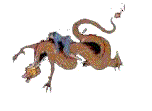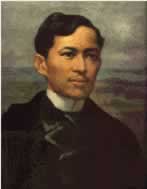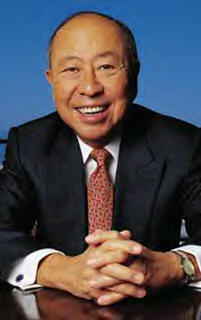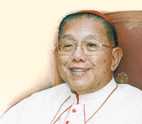The successful minority of Chinoys
Chinese people practiced already middlemen-functions in time of the Spanish galleon trade. This trade between China and America was exclusively handled over Manila and Acapulco. Chinese merchants were necessary for the trade procedures, but they have not been very appreciated by the Spaniards. In 1580, the Chinoys got their own district in the town of Manila (Parian). Anti-Chinese riots and deportation-disposals are already reported from the 16th and 17th century. In the 19th and 20th century approximately twenty to thirty millions Chinese migrated in waves primarily from the southeast, impoverished and overpopulated coastal-regions of China to other regions of Southeast-Asia, but also to California or the Caribbean area. On the Philippines their main sources of income became trading and money lending. Not repaid debts can result in ownership of land. But the Chinoys in general have not been friends of agricultural employments. When there was no admittance to Catholic cemeteries they established their own cemeteries. Special hospitals, schools and newspapers became useful for the community. Some of the migrants stay on the Philippines only for a short time or they commute between the two countries. Others try to assimilate to the country’s manners and habits. One step is the modification of name like in the case of Roxas-Chua or Yuchengcos. Conversion to the catholic belief comes also into consideration. Today, approximately 85 percent of the Chinoys are catholic. Obviously, the institution of the veneration of the ancestors – not known in Christian belief – can also be integrated in the catholic belief. Some identify themselves with their new political homeland. The group of well-educated “illustrados”, which is so important for the Philippine independence-movement, integrated also Chinese Mestizos. The national hero Rizal is such an example. Donations are another way in order to build up social goodwill. Chinoys are holding key-positions in the Philippine economy. In the nineties a study estimated, that approximately half of the thousand Philippine corporations and medium-sized firms are controlled by Chinoys. Magnates, who have accumulated a remarkable fortune, are also called tycoons or taipans. Which factors favored the economic rise of the Chinoys? Capital, which was often small, a higher education, the network-relationships of the Chinese Community and distinctive virtues and value-attitudes. Diligence and loyalty are typical Confucian virtues. Flexibility, endurance and a higher risk-willingness are other characteristics of most Chinoy business men. The last years the Chinese Community was frightened by more and more cases of kidnapping with subsequent ransom demand. There have not been racist pogroms like in Indonesia in 1968. However, successful kidnapping-cases have a cumulative tendency. President Gloria Arroyo, who was first classified as less friendly to Chinese people, assured however, that she will undertake everything, to prevent such criminal infringements. A capital-escape of the Chinoys into other countries is extremely detrimental for the economic development of the country. The globalization of the world economy is already accompanied with a higher mobility of capital and the possibility of buying a citizenship. More than two third of the foreign-investments into the People's Republic of China comes presently from former Chinese migrants. Under the government of Mao they have been condemned as enemies of the state; today however their investments are welcome. To prevent further migrations from the Philippines, President Arroyo has signed in 2001 a naturalization law, facilitating naturalization for such ethnic Chinese, who are born in the Philippines. Chinese people in southeast-Asia are not a homogeneous block. They have their own profile and differ in degree of social integration, cultural closeness to the mother-country as well as in capital-strength. In the following we present some top-representatives of the Chinoy community especially from the economic-scene. It’s evident that the selection is not representative for the whole minority. There are surely some thousand Sari-Sari-Shop owners, vegetable or copra sellers, which have only a very modest capital, didn’t build up large enterprises and who are without any far-reaching economic influence. Jose Rizal
Cojouangco-Clan
The last one is known as a clever Marcos- and Estrada crony. He owns approximately 20% of the shares of the San-Miguel-Corporation, the big beverage - and food-company on the Philippines and is operating as CEO of the company. “Tony” Conjuangco - son of Peping - possesses 44% of the shares of the Philippine Telecommunications Investment Corp., which holds on the other hand, 21% of the well known PLDT, Philippine Long Distance telephones Company. Lucio Tan
He is born in 1934 as son of poor parents in the Chinese province of Fujian. In early childhood-years he came to the Philippines. He studied chemistry but dropped out of college. For a short time, he makes businesses as scrap dealer. Then he is engaged in the distribution of cigarettes. As young man he meets the member of Congress Ferdinand Marcos. Both have a friendly relationship. "That was the key”, so the comment of a short-biographer. In 1966, he establishes the Tobacco-company Fortune Tabaccos. This company is nowadays market leader and sells more than half of all cigarettes on the Philippines. From the government he buys in 1977 a bankrupt bank - the present-day Allied bank. Five Year later, he establishes the Asian Brewery. Because of these business-fields Mr. Tan is also known as „Mr. Cigarette" or - more malicious - as the "cigarettes and boozer-baron”. He is the “nearest crony” of Marcos. One day he organized "love buses", transporting some of his employees. They got the order to cheer the president. Critical observers are coming to the conclusion that Tan procured himself with illegal privileges and concessions. Years later Imelda Marcos is degrading him, when she said: " He's nothing, just somebody who used to buy bottles". The following president Cory Aquino has a critical attitude with respect to him. Tan pursues his businesses without any disturbances. In 1992 he buys from the government the privatized Philippine Airline, PAL, which had it bankruptcy-year in 1998. The way he fired the employees was strongly criticized by the trade-unions. Now he is looking for the friendship of Vice-president Estrada and - after the resignation of President Ramos - he finances the presidential election campaign of Estrada. Tan traveled frequently with the later president Estrada, both are seen very often in the public. Once again, it is told, that he is the „nearest crony” of the president. The president shows his gratitude by annulling a tax-reclamation of 26.5 Mil. Pesos. By this time Tan has already a minority-stake of the Philippine National Bank (PNB). In 1999 the government is offering a 46 %-share for purchase. These shares Tan acquires partially directly, partially by the help of companies, which are financed by Tan-friendly banking houses. These banks transfer to him the voting rights. Now he is majority-owners of the PNB and he can take influence the credit activities of the PNB. His airline and brewery-company are getting credits at low rates of interest. The FORBES-list from 2002 is estimating his fortune at 1.7 Bill. $. He is the Number 1 of Philippine billionaires and has position-place 258 in the world-chart. We mentioned already that the entrepreneur Tan is also strongly criticized. With regard to Tan’s Trials of tax evasion the former economic planning secretary and economic professor Solita Mensol writes: „Lucio Tan is a role model for the worst kind of conduct as far as our national economic objections are concerned. He signals that he can evade taxes and get away with it, pay the courts and get the judges to decide in your favor, get good lawyers and delay your cases”. The 67-years old Tan told in an interview shortly and ironically indicates that he can work under each president. He is not denying being a friend of Estrada, but would have never received any privileges from him. In his activities, he tries to follow one rule of Confucius: Do not do the people things you don´t like others to do to you. John Gokongwei
Nowadays, he has a fortune of round about one billion US$. Part of his fortune is the Universal Robina Corporation and Robinson's Land Inc., furthermore the PCI-Bank (ranking position: 5) together with insurance and credit card subsidiaries. He holds a most of shares of the Digital Telecom, the second-largest telephone-company on the Philippines after the PLDT and some minority-participations of the First Philippine Power Corp., Oriental Petroleum and Minerals Corp. He set up in 1996 Cebu Air and is now a competitor of the Philippine Airline under Lucio Tan. Cebu-Air flies however also to Hong Kong and South Korea. Large real estate-properties in Makati and Ortigas are rounding off the fortune. Alfonso Yuchengco
Already father Enrique laid with rice-mills, an insurance-company, and a building firm the foundations for the later business-conglomerate and he imparted to his 1923 born son the necessary business management know-how, which was completed by studies at the Columbia University. In 1950, he joins the company of his father. He is the one to develop further the businesses. When he retires, he is owner of more than one dozen companies in different industries. In the center of his activities stood the financial sector, represented by companies like the Malayan Group of Insurance Companies, Great Pacific Life Insurance Company, the House of Investments as well as the Rizal Commercial Banking Corporation (RCBC). Over these financing institutes, which belong to him with different shares, he has a decisive influence on other top-businesses in the Philippines. Here some - maybe surprising - interview-sentences about his economic success:
Yuchengco is regarded as a very considered business-man. He knows that his economic power is claimed with welcome. He is at the same time feared, because he is also suspected to initiate the sale of the native economy. He often blocks referrals on his Chinese descent with the question: "Can you show me one Filipino who is 100-percent Filipino "? He is proud on his Chinese descent, as well on his Philippine citizenship. And this is not only a lip-service. Yuchengco was under the presidents Aquino and Ramos five years Philippine ambassador in Red China and in Japan. He likes to refer to the presidents Macapagal and Ramos, when the question comes to the economic development the country. He approves stronger relationships between the ASEAN-Countries as counterbalance to an economically strong Japan. Yuchengco is also a philanthropist. One percent of his business-profit he takes away for beneficent purposes of his AY Foundation. "National Discipline", that includes also diligence, honesty and citizen-sense, is for him a central, but underdeveloped virtue in the Philippines. Logically, he has donated an expensive "Nationally Discipline Award". The offered Award is granted to approximately 500 high school students and is connected with a stipend. The entrepreneur, which delegated in the meantime his businesses to his two sons and a daughter, is also known by larger university-donations. Henry Sy
In the youthful age the 1925 born Henry immigrates with his parents from the southwest of China situated province Fujian. The parents open in Quiapo a store-business, in which they sell above all dry-fruits. During his study at the Far Eastern University in Manila the son helps in the parental business. First, his work is concentrated as middle person in purchasing and selling of shoes. Some scattered shoe-shops are the basis for his later Shoemart distribution chain. Now he begins to think in wider distribution-dimensions. He erects in the consequence-time department stores and big shopping centers, for example the SM-Megamall in Quezon, Mandaluyong City and Cebu. He equips his shopping centers also with cinemas and video game-areas to attract additional shoppers. The SM-Group stands also behind the following commercial companies: Supervalue Supermarket / SLJ Stores / Star Appliance Center / Hardware Workshop / Super-plus Marketing / Leading Apothecary / Cafe Elysees / SM Auto Services / Leisure Center. In interviews, he formulated for example, the following guiding principle: "Each one of us is given by God equal time - 24 hours at day. It is up to us if we want to use this time and how we use it “- " I was not first in academics, but I was the group leader " - " Only the first million is difficult to make. After that, the rest is easy ". The daily earnings of his more than 20.000 co-workers was in 2002 only approximately 360 Peso, that corresponds to something more than 7 €S. A many-headed family lives with this earning from hand to mouth. There is nearly no chance to build up savings. The staff policy of SM was also a topic of criticism. It is told that the personnel manager annul protection against dismissal by offering only short-time contracts and that they have a have with regard to recruitments a preference for members of the Iglesia ni Cristo, because they are not allowed to go on strike by their church officials. George Ty
Angelo King
As philanthropist, Angelo King made a name for himself. He is well known by his - in 1978 established - Angelo King Foundation, the Angelo King St.Luke´s Medical Center, the Angelo King Research Center, the Angelo King Multi-Purpose-Center and the Angelo King-Kaisa Heritage Center. The Kaisa-Foundation has as its goal the promotion of harmonic and productive intercultural relationships between the Chinoys and other groups of the Philippine population. Its credo is: "Our blood may be Chinese, but our roots grow deep in Filipino soil, our bonds are with the Filipino people". The foundation runs a museum, which is worth seeing in Makati, archives and conference rooms. Publications should forge links between the Chinoys and the Philippine society. Angelo King has donated to the De La Salle University several building-complexes. Yu Tan
He did not inherit his later wealth. The parents in Bicol traded with copra, the father dies early. It is reported that he got his first shoes in the age of ten years. With thirteen years, he leaves the school, to help the widowed mother. He travels around buying and selling T-shirts and others textiles. With eighteen years, he makes his first million and he is investing the money in a textile-mill and in properties. Buying up, developing and selling of properties becomes his central life-task. Real estates can decrease in value, he said once, but not properties, because they get less every day. Today, his family is owner of round about 20,000 hectares of property. After the government he is the second-biggest landowner in the Philippines. Yu Tan is “transnational ", a lot of his over 100 companies have their place of business in abroad - in China, Taiwan, Canada or the United States. Yu Tan always thought, it is important not to use outside capital. In interview-remarks, also he emphasized the value of work: "There is no such thing as luck. Success is all hard work and persistence ". Chinoys can also be found on prominent position in the sector of medicine and literature for example the emigrated novelist Jessica Hagedorn. However, we should also mention the former Cardinal Sin. JAIME L. SIN
His father emigrated from China and was a merchant in Visayas. Cardinal Sin told once, if his parents would have practiced family-planning practices, he would not be existent. He was the 13th child of the family, which counted altogether 15 children. He visits a seminary and gets a diploma in educational sciences. After his ordination as priest in 1954 he makes very quickly a career in the church hierarchy. Maybe that his position as prelate of Pope John XIII - starting in 1960 - has been helpful for his clerical career. He is appointed as bishop and archbishop in Jaro and in 1974 he becomes archbishop in Manila. 1976 he is installed as an cardinal. More and more, he becomes the brave antipode of ex-president Marcos. Nonetheless he conducted the ceremonies of baptism and marriage of the children of Marcos. Publicly, he denounces the suppression-politics of the dictator and he demands his resignation. On occasion of the burial of the murdered Benigno Aquino he formulated this sentence: „The Filipino has become stranger in his own country”. He approves in the interest of democracy a bloodless People-rebellion, supports the People-Power-movement and he helps Corazon Aquino to become the next president of the Philippines. He - looking often after the proximity of the politicians - , gives later also commentaries on political topics. He demanded finally the resignation of ex-president Estrada. There was always a controversial debate with regard to his conservative position on birth contraception and divorce. He refused approaches of the Liberation Theology and blocked as a strict Anti-Communist social-revolutionary movements. © Wolfgang Bethge, 2003 |




 A
A



 T
T